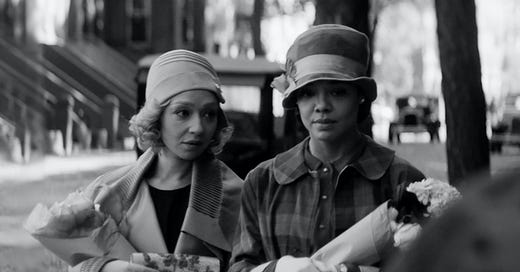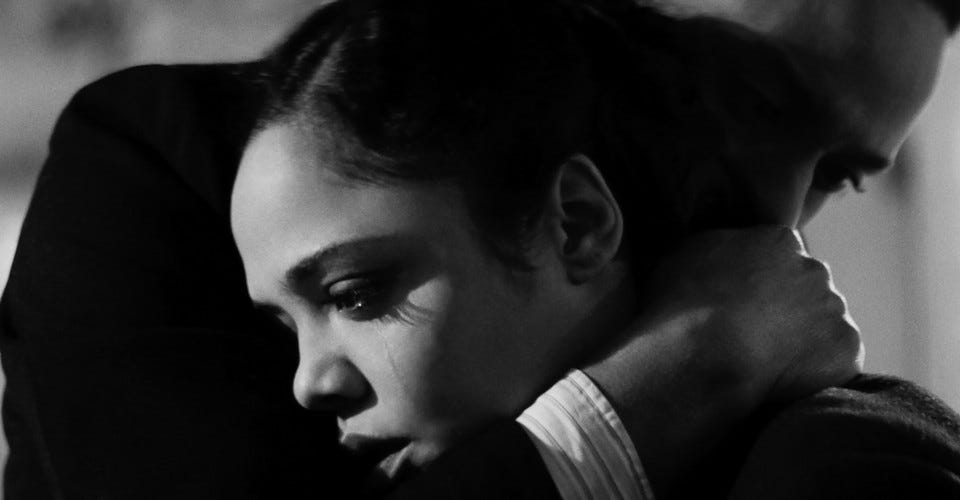"Passing" Thoughts
Rebecca Hall's directorial debut adapts Nella Larsen's 1929 novel for Netflix; Farewell to Dean Stockwell
The Nut Graf: Hall has the right stuff as a director, but the reason to catch this drama set in 1920s Harlem is for a very good performance by Ruth Negga and a great one by Tessa Thompson. (*** stars out of ****)
Rebecca Hall has long been an actor I’ve admired for her thoughtful elegance and seriousness of purpose, and the question isn’t why she decided to direct a movie but what took her so long. Hall’s behind-the-camera debut, “Passing,” lands on Netflix today after premiering at Sundance in January and appearing in theaters last month, and it is well worth attending to – a little stiff and self-conscious in its filmmaking, but haunted by two excellent performances, the endless aftershocks of America’s racial past, and Hall’s own family history. (Her maternal grandfather passed for white and hid the fact from his family, including Hall’s mother, opera singer Maria Ewing.)
Like many who have read it, Hall fell in love with Nella Larsen’s slim 1929 novel about two women, childhood friends in New York City, who reconnect as adults in very different circumstances. Irene (Tessa Thompson) is the wife of a successful Harlem doctor (André Holland), mother of two sons, socially progressive, rather prim. Clare (Ruth Negga), who was raised by white relatives after her biracial father died, has been passing as white for years, so successfully that even her racist businessman husband John (Alexander Skarsgård) has been fooled.
The story is of the dance these two women do around each other, Clare drawn to Irene’s bourgeois contentment and Irene simultaneously fascinated and repelled by Clare’s imposture. (Why would she ever want to pass as white “when I have everything I’ve wanted,” the light-skinned Irene asks rhetorically, forgetting that we’ve seen her gingerly doing just that while shopping in midtown Manhattan in the film’s opening scenes.) “Passing” is set against the backdrop of the Roaring 20s and the Harlem Renaissance, Hall capturing the era in spare but telling details like the copy of the NAACP magazine “The Crisis” Irene is seen reading before bed. Edu Grau’s black-and-white cinematography at times feels bioluminescent and at other times is moody with the shadows of a quiet brownstone afternoon. The soundtrack is filled with the rolling, otherworldly piano of Emahoy Tsegué-Maryam Guebrù, a 97-year-old Ethiopian nun whose version of barrelhouse extends a deceptively benevolent calm over the proceedings. All these elements feel slightly studied, as if Hall had been thinking about how to make the film for years, which presumably she has. At the same time, “Passing” is incredibly attentive to the complexities and identities flowing back and forth between these women and within Irene, who’s the more cautious and judgmental of the two and whom novelist Larsen – and, by extension, director Hall – view with a mixture of sympathy and critique.
Ty Burr’s Watch List is a reader-supported newsletter. Both free and paid subscriptions are available. Those who want to support my work are encouraged to take out a paid subscription.
Clare’s ability to pass for white is an affront to Irene’s New Negro sensibilities, but she envies her friend’s freedom of movement as much as she censures it. Clare also represents a threat on the domestic front, through her flirtations with Irene’s husband, and she exposes Irene’s sophistication as a sham. Out in the real world, the doctor assures his wife, there are lynchings their sons need to know about, to which she stiffly responds, “You are not to talk about the race problem. I won’t have it.” Something has to give way and pop the bubble Irene has meticulously made of her life, and it’s the achievement of the storytelling that when the resolution comes it resolves nothing. The America that has made Clare turn her life into a lie and made Irene hide from the world – that teaches their children the N-word and threatens their men with dismemberment – that America is still there, unmovable.
The acting is satisfyingly rich, as is often the case when an actor directs a movie. Negga plays Clare as a sort of damaged Holly Golightly, skating gaily on the surface of her daring and waiting for the ice to break – it’s a brittle and terribly sad performance. But Thompson is at the center of the story and the screen, and she renders the paradoxes of this rigid middle-class Black woman with intuitive shadings and charged emotional swings that feel as though they’re happening in real time – as though Irene were sensing herself melting away and were powerless to do anything about it. I’ve been a Tessa Thompson fan since seeing her steal “Dear White People” (the 2014 movie, not the subsequent series) and have followed her through “Selma,” “Creed,” “Annihilation,” “Sorry to Bother You,” and the too-little-seen “Little Woods” and “Sylvie’s Love.” “Passing” is a strong and steady debut for its director, but it’s also confirmation that there’s a great actress among us and we should be paying closer attention.
Instead of commenting on the career of Dean Stockwell, who died Sunday at the age of 85, I’ll send you to the estimable Sheila O’Malley, who wrote about her fascination with this most peripatetic of movie stars back in 2007 and who contributed a marvelous appreciation at rogerebert.com today. And I’ll drop some of Stockwell’s more memorable moments right here. R.I.P., good sir — in dreams we walk with you.
If you enjoyed this edition of Ty Burr’s Watch List, please feel free to share it with friends.
If you’re not a paying subscriber and would like to sign up for additional reviews and to join the discussions, here’s how:
If you’re already a paying subscriber, I thank you for your generous support.





